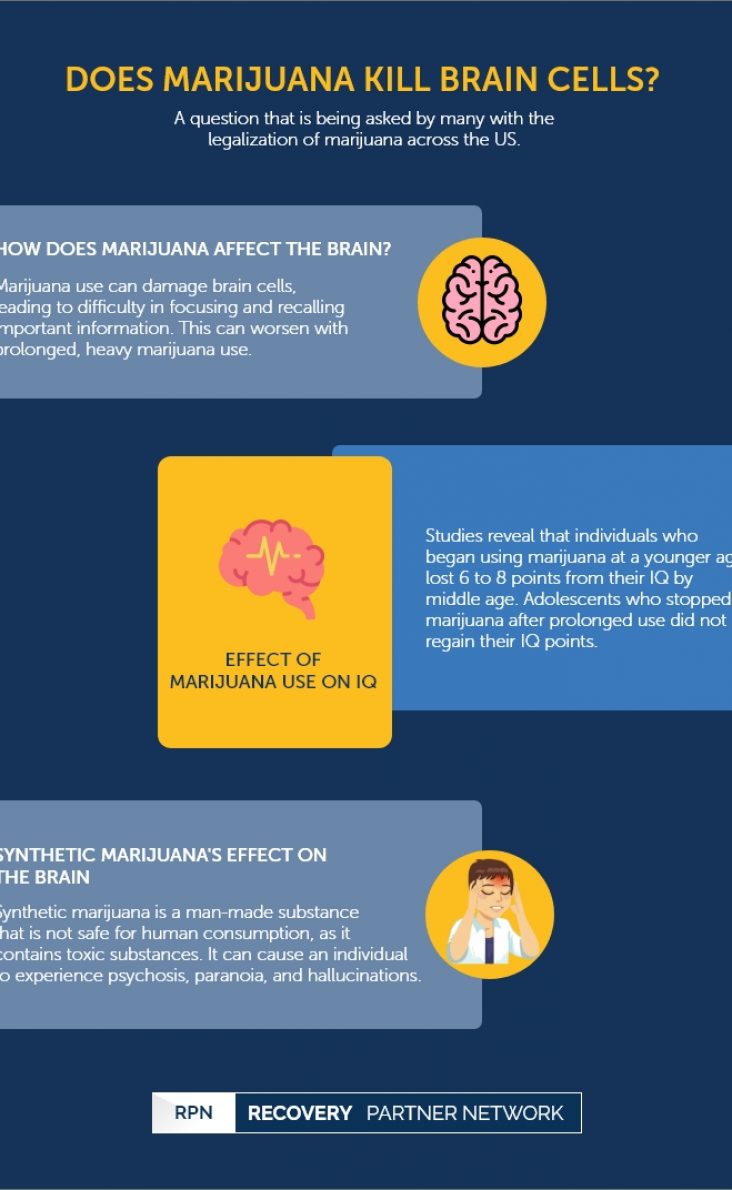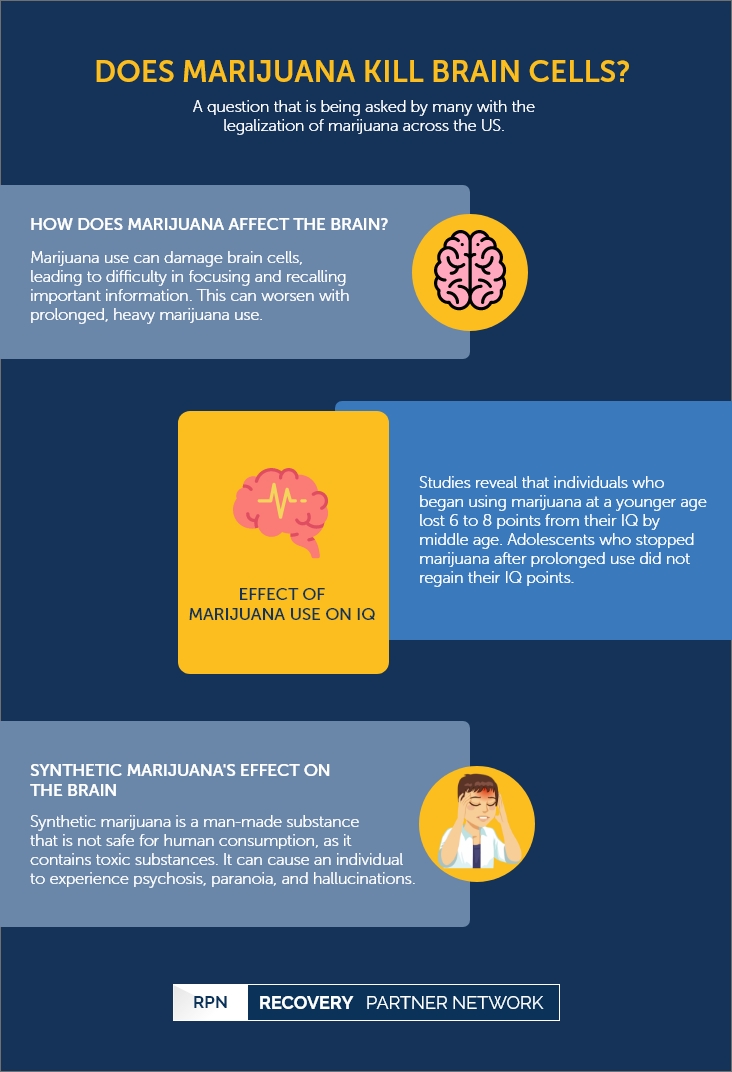A question that is being asked by many since the legalization of marijuana across the US.
Does Marijuana Kill Brain Cells?
Illicit drugs
- Ayahuasca addiction – Abuse
- Baclofen addiction
- Black tar heroin addiction
- Cannabis addiction
- Cocaine dependence
- Crack cocaine addiction
- DMT addiction abuse treatment
- Does Marijuana Kill Brain Cells?
- Ecstasy addiction
- Gabapentin addiction
- gamma-Hydroxybutyric acid addiction
- Hallucinogen
- Heroin addiction
- Illicit drug addiction
- Inhalant addiction
- Cocaine
- Ketamine addiction
- Lysergic acid diethylamide addiction
- Mescaline addiction
- Methamphetamine addiction
- Meth Labs: Cooking up Addiction
- Meth Mouth
- Microdosing
- Phencyclidine addiction
- Psilocybin mushroom addiction
- Sage of the diviners – Addiction
- Shooting Heroin
- Shooting Methamphetamine
- Smoking Cannabis
- Speedball
- Synthetic cannabinoids
Does Marijuana Kill Brain Cells? | Table of Contents
How Does Marijuana Affect the Brain?
As recreational use of marijuana is legalized throughout most parts of the US, many are left wondering about the effects and impact this drug may have on the brain in the long run. Similar to how prolonged use of alcohol, meth, and heroin can result in irreversible brain damage, prolonged marijuana abuse can also impact the brain cells’ ability to convey a message.
Marijuana use can damage brain cells, resulting in a number of concurrent symptoms throughout the body. Certain components of marijuana attach to specific receptors in the brain. Tetrahydrocannabinol (THC), marijuana’s primary psychoactive ingredient, attaches to the brain’s cannabinoid receptors (officially known as cannabinoid receptor type 1 or CB1) that regulate memory, appetite, pain, and mood. When an individual smokes marijuana, they may experience difficulty in focusing and recalling important information. This can worsen with prolonged, heavy marijuana use, resulting in poor memory and concentration.
Scientists are yet to uncover the long-term effects of marijuana on the brain. However, there are studies currently available that show the direct link between lower levels of IQ among individuals who consumed marijuana regularly as children or adolescents. Therefore, it is logical to assume that exposure to THC during childhood or early years of adolescents can cause cognition and memory impairments later on in life.
Effect of Marijuana Use on IQ
The number of brain cells killed by marijuana use would highly depend on the amount of marijuana smoked and the user’s age. Marijuana can negatively affect the brains of individuals under the age of 25 as their brains are fully yet to develop.
A study on marijuana’s effects on IQ revealed that individuals who began using marijuana at a younger age lost 6 to 8 points from their IQ by the time they reached middle age. Moreover, individuals who stopped marijuana use after smoking throughout their adolescence did not regain their IQ points, and individuals who began using marijuana in their adulthood did not undergo any IQ loss.
FAQ
According to research conducted on marijuana users, those who never used marijuana showed a slight IQ increase over time. While heavy users experienced steady IQ declines proportional to how long and how much they had smoked.
Synthetic Marijuana’s Effect on the Brain
Synthetic marijuana is a man-made, hallucinogenic substance that is typically sprayed onto plant materials. It is not safe for human consumption but has become quite popular in recent years. Also known as “fake weed,” synthetic marijuana generates mind-altering effects, causing the user to behave in an unusual manner. Synthetic marijuana is illegal and contains toxic substances that can cause unexplained bleeding, vomiting, and increased heart rate.
Like marijuana, synthetic marijuana also impacts the brain by attaching to the cannabinoid receptor type 1 (CB1) that is found in the central and peripheral nervous systems. Synthetic marijuana attaches more strongly to CB1 receptors than THC, making it 100 times more potent in the brain. Since CB1 receptors have multiple locations in the brain, side effects can be severe and harmful.
Synthetic marijuana may cause the user’s body and brain to encounter:
- Seizures
- Psychosis
- Paranoia
- Hallucinations
- Altered perception
- Euphoria
- Violent behavior
- Stroke
- Cardiac and respiratory problems
- Kidney and brain damage
- Memory loss
Apart from the above symptoms, synthetic marijuana can also cause addictions in individuals who consume it. Addiction is a chronic disease that directly affects the brain and increases risky behaviors that can cause further damage. After prolonged synthetic marijuana use, brain cell activity is likely to deteriorate with a concurrent increase in negative physiological symptoms like the ones mentioned above.
FAQ
The long-term effects of marijuana do not cause permanent damage to the brain, but it does, however, cause memory and learning impairments.
Adolescents may be more vulnerable to potential consequences of marijuana use than adults due to their ongoing neuromaturation during youth.
Short- and Long-Term Effects of Marijuana Use on The Brain
Some of the immediate, short-term effects of marijuana use on the brain are:
- Difficulty remembering
- Confusion
- Difficulty judging distances
- Paranoia
- Anxiety
- Fatigue
Long-term effects of marijuana use include, but are not limited to:
- Increasing marijuana tolerance
- Some memory loss
- Higher chances of experimenting and abusing other drugs
- Marijuana dependence
- Cognitive impairment
FAQ
Marijuana use can cause changes in the size and density of a user’s brain.
Among heavy marijuana using adults, neurocognitive deficits are apparent for several days following marijuana use but tend to disappear after one month of abstinence.
Recovery Partner Network
We aim to educate and empower. If you feel our library of resources does not cover your specific need, reach out to us, and we would be happy to help.
STATISTICS
© Copyright 2024


